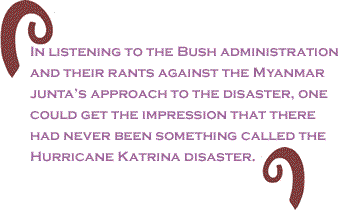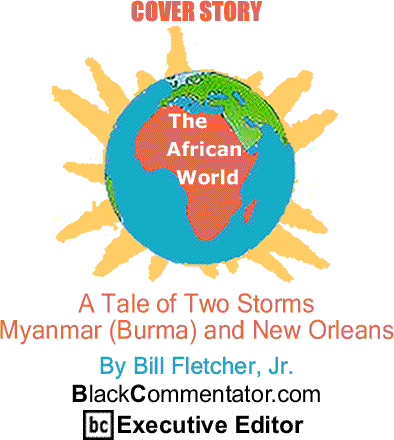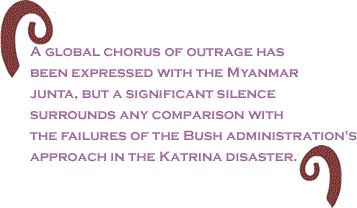
|
||||||||||||||||||||||
 |
||||||||||||||||||||||
 |
||||||||||||||||||||||
 |
||||||||||||||||||||||
 |
||||||||||||||||||||||
 |
||||||||||||||||||||||
 |
| The current issue is always free to everyone |
|
|
 |
| Sometimes you hear things that are so unbelievable that you wonder whether it was all in your imagination. That is precisely the way that i felt in listening to comments by the Bush administration on the disastrous cyclone that hit the south Asian nation of Myanmar (Burma). Don't get me wrong. I am no fan of the military junta that runs Myanmar (Burma) and has both repressed its people and served the multinational corporations. I am sickened by their anemic approach in responding to the disaster, one in which it is now estimated that at least 127,000 people may be dead. Yet in listening to the Bush administration and their rants against the Myanmar (Burma) junta’s approach to the disaster one could get the impression that there had never been something called the Hurricane Katrina disaster. Consider, for just a moment, the Bush rhetoric; in fact, just consider one piece of it. President Bush criticizes the Myanmar (Burma) junta for its failure to allow into the country foreign aid workers to help with disaster recovery. While this criticism appears to be absolutely correct, it ignores an interesting fact: in the aftermath of the Katrina disaster the governments of both Cuba and Venezuela offered badly needed assistance. The Bush administration, under those circumstances, either ignored the offers or turned them down. In fact, the Cuban government had experienced personnel on standby prepared to fly to the Gulf Coast (note: Cuba has a great deal of experience with hurricanes). What is striking here is not only the hypocrisy of the Bush administration but that few commentators have even noticed. A global chorus of outrage has been expressed with the Myanmar (Burma) junta, but a significant silence surrounds any comparison with the failures of the Bush administration's approach in the Katrina disaster.
In the case of Katrina, the economic policies over the years have drained the public sector of the resources that are needed for disaster response. In the case of New Orleans, as we now know (and as experts AND the people of New Orleans knew then) the levees were not in any shape to withstand a major storm. Coupled with this was the Bush administration's own incompetent response to the disaster, betraying a class and racial bias against the people who were the principal victims of the storm. The refusal to accept outside assistance from Cuba and Venezuela simply added salt to the open wound. The Bush administration's hypocritical rhetoric should remind us that the Katrina wound has not been healed. The Bush administration has learned nothing from the disaster except how to take advantage of it to advance its pro-privatization agenda for economic development, along with the ability to change the demographics of New Orleans in order to make it more likely that the Republican Party can gain ground. In that sense i see very little difference in the response of the Myanmar (Burma) junta and the Bush administration to disasters in which thousands of innocent victims have perished or been displaced.
When the Black Radical Congress (blackradicalcongress.org) convenes in St. Louis [June 20-22], they, along with other Black activists around the country need to consider our collective failure to respond en masse to the Katrina disaster and the implications for what should now take place. My guess is that there are activists across Myanmar (Burma) who are grappling with similar issues and pondering how they can challenge those who turned a natural disaster into a political, economic and humanitarian catastrophe. We probably have much to learn from one another. BlackCommentator.com Executive Editor, Bill Fletcher, Jr., is a Senior Scholar with the Institute for Policy Studies, the immediate past president of TransAfrica Forum and the co-author of the just released book, Solidarity Divided:The Crisis in Organized Labor and A New Path Toward Social Justice(University of California Press), which examines the crisis of organized labor in the USA. Click here to contact Mr. Fletcher.
|
Your comments are always welcome. e-Mail
re-print notice
If you send us an e-Mail message we may publish all or part of it, unless you tell us it is not for publication. You may also request that we withhold your name. Thank you very much for your readership. |
|
| May
22, 2008 Issue 278 |
|
| Executive Editor: Bill Fletcher, Jr. |
| Managing
Editor: |
| Publisher: Peter Gamble |
| Est. April 5, 2002 |
| Printer Friendly Version in resizeable plain text format or pdf format. |
 |
 |
 |
| |
| |































